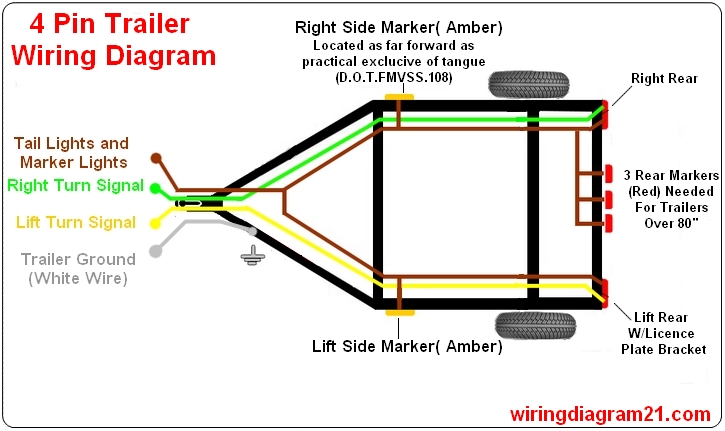From 4-Pin to 7-Way: Trailer Wiring Wonders!
So, you've got a trailer hitch, but what about the electrical connection? A 4-pin connector might work for basic lighting, but if you're hauling something bigger, or need more advanced features, you'll likely need to consider a 7-way upgrade. It's a bit like going from dial-up to broadband for your trailer. Let's dive into the world of trailer wiring, specifically the leap from a 4-pin to a 7-way connection.
Wiring up your trailer correctly isn't just a good idea; it's crucial for safety on the road. Think about it – your trailer's lights are vital for signaling your intentions to other drivers. A proper 7-way connection ensures everything from brake lights and turn signals to running lights and electric brakes function as they should, keeping you and others safe. Upgrading from a 4-pin setup to a 7-way opens a whole new world of towing capabilities. This move lets you power more complex trailer functions, such as electric brakes, auxiliary power, and even reverse lights. If you're planning to haul heavier loads or upgrade to a more advanced trailer, this conversion is essential.
Historically, trailer wiring began with simpler systems, gradually evolving to meet the increasing demands of larger and more sophisticated trailers. The 4-pin connector sufficed for basic lighting needs, but as trailers grew in size and complexity, the need for additional circuits became apparent. This led to the development of the 7-way connector, which provides dedicated connections for brakes, auxiliary power, and other functions. The evolution mirrors the progression of vehicle technology itself, moving from basic functionalities to integrated systems. Adapting your trailer wiring to a 7-way system ensures compatibility and opens up opportunities for enhanced towing capabilities.
A 4-pin connector provides the essentials: tail lights, turn signals, and ground. This is fine for smaller trailers like utility trailers or small boat trailers. However, a 7-way connector adds a whole other level of functionality. It includes circuits for electric brakes, a 12-volt auxiliary power line (often for charging a trailer's battery or powering appliances), reverse lights, and sometimes even an extra ground. Understanding this difference is key when choosing the right wiring for your trailer.
Imagine hooking up a camper with its own battery system. A 7-way connection allows you to charge the trailer's battery while you're on the road using the auxiliary power line. Or, picture yourself reversing a larger trailer in a dimly lit area. The dedicated reverse light circuit on a 7-way connector makes maneuvering much safer and easier. These are just a few examples that highlight the added benefits and increased safety of upgrading your trailer wiring.
One major issue associated with improper 4-pin to 7-way conversions is the risk of short circuits and blown fuses. This can stem from faulty wiring, incorrect connections, or the use of incompatible components. In some cases, poor wiring practices can even lead to overheating, potentially causing damage to the vehicle's electrical system or even starting a fire. Therefore, understanding the intricacies of the wiring process and using appropriate components is essential for a safe and functional setup.
Advantages and Disadvantages of 4-Pin to 7-Way Conversion
| Advantages | Disadvantages |
|---|---|
| Enhanced safety with electric brake control | More complex installation than a 4-pin system |
| Powering additional trailer features like auxiliary lights and appliances | Higher initial cost due to additional components and wiring |
| Improved visibility with reverse lights | Requires a compatible 7-way connector on the towing vehicle |
Frequently Asked Questions about 4-Pin to 7-Way Trailer Wiring:
Q1: What tools do I need for the conversion? A: Basic tools like wire cutters/strippers, crimpers, a test light, and electrical tape are necessary.
Q2: Can I do this myself or should I hire a professional? A: If you're comfortable with basic wiring, it's a DIY project. If not, consult a professional.
Q3: Where can I buy a 7-way connector and adapter? A: Auto parts stores, online retailers, and RV supply stores usually carry them.
Q4: What gauge wire should I use? A: Consult your trailer and vehicle manuals to determine the appropriate wire gauge.
Q5: How do I test the wiring after installation? A: Use a test light to verify each circuit is functioning correctly.
Q6: What are common wiring problems? A: Loose connections, corroded wires, and blown fuses are typical issues.
Q7: How do I troubleshoot electrical problems? A: Start by checking the fuses and connections, then systematically test each circuit.
Q8: Can I tow a trailer with electric brakes using a 4-pin connector? A: No, a 7-way connector is required for electric brake functionality.
In conclusion, converting your trailer wiring from a 4-pin to a 7-way system is a significant upgrade that unlocks a range of benefits, from improved safety with electric brakes to the convenience of auxiliary power. While the task might seem daunting, understanding the wiring principles and taking the necessary precautions ensures a smooth and successful transition. By investing time and effort in properly wiring your trailer, you're not just enhancing your towing capabilities; you're prioritizing safety on the road. So, gather your tools, follow the guidelines, and enjoy the peace of mind that comes with a well-wired trailer. Don't hesitate to consult professional help if needed, but remember that with a bit of patience and the right information, you can conquer this wiring project and elevate your towing experience to the next level. It's an investment that pays dividends in both safety and functionality. Safe travels!
Decoding the hues of the cosmos what color are the planets
Rory mcilroy ken mcelroy
Late model race tonight high octane action on the oval














